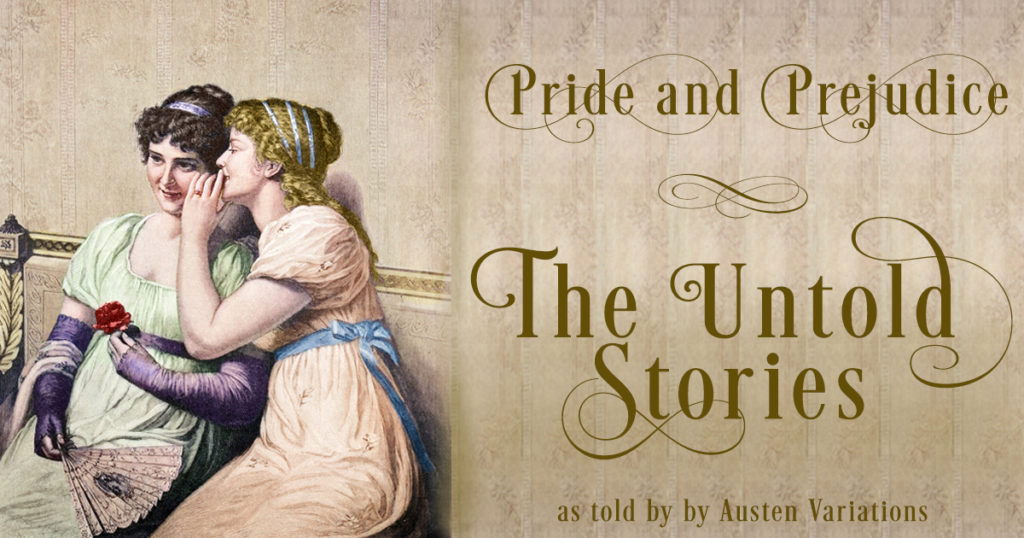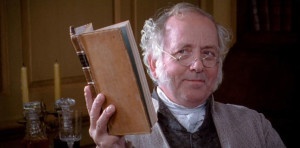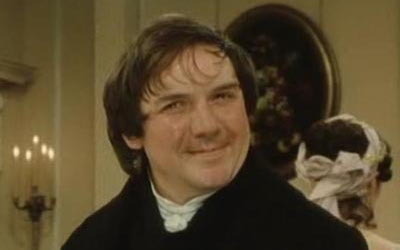
What entertaining absurdities does Mr. Collins’s letter contain?
October 4, 1812
 Mr. Bennet reposed in his library after breakfast, his feet propped up on a stool and a highly enjoyable book before his nose. With the most troublesome of his daughters permanently gone from the house and the most angelic one advantageously engaged, he had little left to wish for but that the peace of his household might last. He did not expect it to, however. Just as the little tyrant across the channel could not seem to behave himself for long, so too his own wife and at least one of his offspring were bound to soon involve him in another round of hostilities.
Mr. Bennet reposed in his library after breakfast, his feet propped up on a stool and a highly enjoyable book before his nose. With the most troublesome of his daughters permanently gone from the house and the most angelic one advantageously engaged, he had little left to wish for but that the peace of his household might last. He did not expect it to, however. Just as the little tyrant across the channel could not seem to behave himself for long, so too his own wife and at least one of his offspring were bound to soon involve him in another round of hostilities.
But the interruption that particular morning came from an entirely different source, and one not at all unwelcome. It was a letter – a letter from his cousin Mr. Collins.
In the months since the renewal of their acquaintance, Mr. Bennet had come to regard Mr. Collins’s correspondence as a priceless source of amusement. He would by no means have given up the association on any grounds less consequential than the impediment that death itself would have constituted. So Mr. Bennet tossed his book aside; the newly arrived missive promised the finer entertainment.
He was not disappointed.
The absurdity of the letter’s style – all affected humility and artificially formal language – was just what Mr. Bennet had come to expect. But the content was far beyond anything he had imagined. It began predictably enough with and extravagant discourse in congratulation of the approaching nuptials of Mr. Bennet’s eldest daughter.
 “…You may be assured, my dear sir, that Mrs. Collins and I send our very sincere felicitations to my cousin Jane and to you, her honored parent. What a triumph for you all – especially after that most regrettable affair with your youngest daughter – that your fortunes are so quickly on the rise again. I must confess that it has astonished me exceedingly. The thing speaks in credit to Mr. Bingley, I suppose, that he is so generous as to overlook what many certainly could not have – that is, your family’s fatally tainted circumstances. He must be a gentleman of true worth, as well as being one of greater consequence than my cousin had any cause to hope for. I am sure you are all to be heartily congratulated on forming such a favorable alliance.”
“…You may be assured, my dear sir, that Mrs. Collins and I send our very sincere felicitations to my cousin Jane and to you, her honored parent. What a triumph for you all – especially after that most regrettable affair with your youngest daughter – that your fortunes are so quickly on the rise again. I must confess that it has astonished me exceedingly. The thing speaks in credit to Mr. Bingley, I suppose, that he is so generous as to overlook what many certainly could not have – that is, your family’s fatally tainted circumstances. He must be a gentleman of true worth, as well as being one of greater consequence than my cousin had any cause to hope for. I am sure you are all to be heartily congratulated on forming such a favorable alliance.”
From these flattering and solicitous remarks, Mr. Collins moved on to his real purpose for writing, and to what was for Mr. Bennet the truly diverting portion of the letter. It seemed that the pompous clergyman had got it into his head that Mr. Darcy was violently in love with Elizabeth and meant to make her an offer.
“Oh, this is admirable!” Mr. Bennet told himself, laughing aloud after reading this delightful passage. “Mr. Darcy, of all men!”
Had Mr. Collins canvassed the whole world, he could not have hit upon a more ridiculous notion and a less plausible suitor for Mr. Bennet’s favorite daughter. That Lizzy should be the romantic object of that proud, disagreeable man stretched the limits of credulity. Lizzy, who had been so outspoken in her pointed dislike of the man! Surely her true sentiments could not have escaped anybody’s notice. Regardless of his high opinion of himself, Mr. Darcy could not be such a fool as to contemplate approaching her.
Mr. Bennet chuckled as he pictured the scene that might ensue if the man ever tried. No doubt his high-spirited daughter would make quick work of poor Mr. Darcy. She would probably hiss like an incensed feline at this first avowal of affection, and threaten to scratch his eyes out if he ventured anywhere nearer the question than that. It would certainly be a sight to behold, one Mr. Bennet would give a tidy sum to witness for himself.
The rest of the letter was pure Mr. Collins – his obsequious attentions to Lady Catherine de Bourgh’s opinions in the matter (she disapproved, not surprisingly), his not-so-subtle hints of what was due that lady’s opinion, and his intended kindness in warning the Bennets against crossing her. Then there was the bit about Charlotte’s interesting situation, the expected young “olive-branch,” which struck Mr. Bennet as being in poor taste to mention.
Finally Mr. Bennet could no longer keep these overpowering temptations to mirth for himself alone, not when his daughter would likewise appreciate the absurdities involved. Leaving the sanctuary of his library, Mr. Bennet ran straight into the person he sought.
“Lizzy,” said he, “I was going to look for you; come into my room…”

9 comments
Skip to comment form
It’s a shame he hadn’t read the book before giving his opinions so decidedly!😉 but at least he should have maybe been prepared when Darcy arrived? 😂
Author
Haha! If he had read the book, he would know what was coming. That’s true. But he would still have had to say his lines as if he meant them. Right?
Absolutely hilarious. There is always that one relative in any large enough family, and unfortunately for poor Mr. Bennet that one is known to him. Great work!
Author
Thanks, Almira! So glad you enjoyed this. It was fun to write, as are my P&P supplemental novels!
Hey Shannon! Love it….I often wondered what happened prior to the scene when Mr. B goes looking for Lizzy. I feel sad that as much as Lizzy is his favorite, he still does not know her as well as he thinks he does, and still makes sport of her. He won’t know what hit him when things finally come to light. I look forward to hearing about that. Thanks Shannon.
Author
Glad you enjoyed this piece, Char! I guess he can’t be blamed too much for thinking a D&E match was impossible, since E made no secret of how much she disliked him. But you’re right that Mr. B isn’t the best father (or husband). I think of when Bingley abandoned Jane, and he tells Lizzy, “Your sister is crossed in love, I find. I congratulate her. Next to being married, a girl likes to be crossed a little in love now and then. It gives her something to think of , and it gives her a sort of distinction among her companions.” Not very sensitive.
Love the stories as always 🙂 A few typos- 1) “the pompous clergyman had go it into is head” should be got it into his head. 2) “Mr. Darcy could not be such a food as to contemplate approaching her” should say could not be such a fool. 3) “She would probably hiss like and incensed feline” should be hiss like an incensed feline.
Author
Thanks, Laura. I’m pleased that you enjoyed the post, and I’m sorry for the typos. I had to retype this whole post (instead of copying/pasting from the original document), and I guess I wasn’t as accurate as I thought! Spell check didn’t help me either since “go/food/and” are real words! Haha!
Heehee, don’t worry Mr. B, Lizzy already hissed at him the 1st proposal, he’ll get it right this time